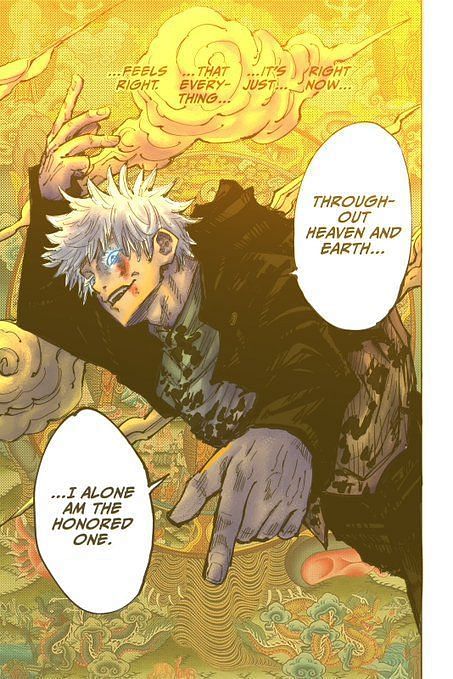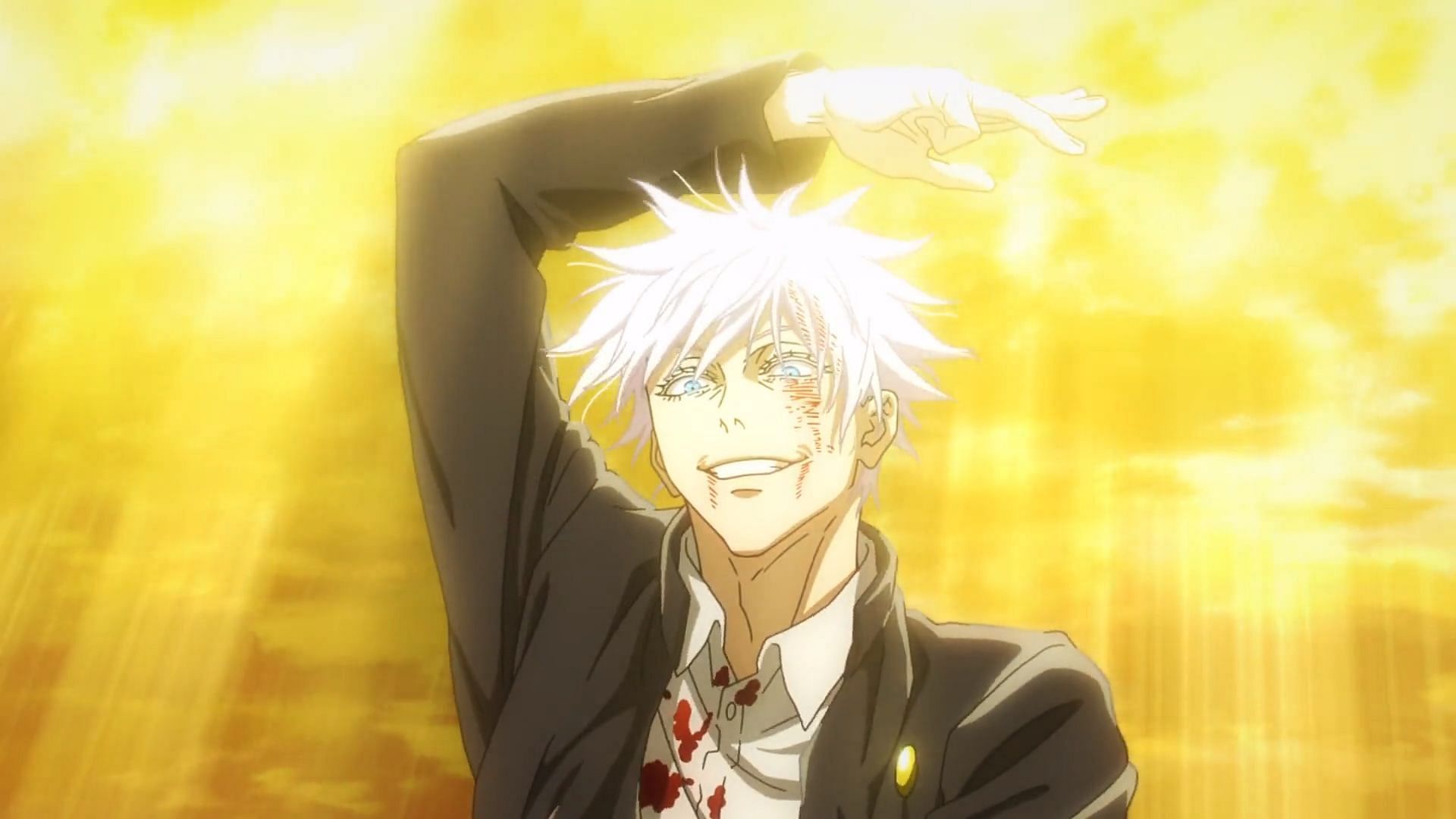AI-Generated Article
This content has been automatically generated using artificial intelligence technology. While we strive for accuracy, please verify important information independently.
Have you ever heard a phrase that just sticks with you, perhaps because of its immense power or maybe its deep, somewhat mysterious meaning? There's a saying that has truly captured the minds of many, especially those who follow the exciting world of a certain popular anime series. It's a declaration that echoes with a profound sense of self-belief and, in some ways, a grand destiny. This isn't just any old line; it carries a weight of history and spiritual thought, too.
The phrase we're talking about, "throughout heaven and earth, I alone am the honored one," has certainly become iconic. It's a statement that, for many, brings to mind a character of incredible strength and confidence. But where did this powerful declaration truly come from? Is that, you know, just a cool line for a fictional hero, or does it have roots in something much older, something with a lot more historical depth? We're going to explore its journey from ancient texts to modern-day pop culture.
So, what does it truly mean to be "the honored one" across all of existence? We'll look at the different ways people have understood this idea, from its initial spiritual origins to how it's used today in stories. It's a bit like peeling back layers, uncovering the various thoughts and feelings this particular set of words can bring forth.
Table of Contents
- The Origin of a Powerful Phrase
- Buddha's Birth and the Seven Steps
- Meaning in Buddhism: Humility or Supremacy?
- Gojo Satoru and the Jujutsu Kaisen Connection
- Sukuna's Twist on the Declaration
- Fan Theories and Community Discussions
- Frequently Asked Questions
The Origin of a Powerful Phrase
The saying, "throughout heaven and earth, I alone am the honored one," holds a very special place in history and, you know, in spiritual traditions. It isn't something that just appeared out of nowhere. This profound statement actually comes from ancient Buddhist texts, most notably the Lotus Sutra. The Lotus Sutra, a very influential and much-respected Mahāyāna Buddhist sūtra, contains this particular line within its treasure tower chapter. It's quite old, apparently.
When we talk about its beginnings, we often look to the moment of the Buddha's birth. It's said that immediately after his arrival, the Bodhisatta, or future Buddha, stood firmly on his feet. He then took seven steps to the north, and with each step, lotus flowers reportedly bloomed beneath his feet. That's a rather beautiful image, isn't it? At this truly remarkable moment, he uttered these very words.
There are, of course, slightly different ways this quote has been expressed across various texts and translations. For instance, you might hear it as "In heaven and on earth, I alone am the honored one," or even "Above the heavens, below the earth, I alone am the holy one." The Pali version, a bit like a cousin to the Sanskrit, isn't quite as strong in its phrasing, but it still carries a similar weight. It's fascinating how a single idea can be conveyed with such subtle differences in wording, you know, yet still keep its core message.
This phrase, in its original literary Chinese form, 天上天下,唯我獨尊, is a variant translation of 「天上天下唯我為尊」. It comes from Buddhayaśas's and Zhu Fonian's Chinese translation of the “Sutra of the Past Vows of the Bodhisattva Kṣitigarbha.” So, it's pretty clear this isn't a new thought; it's got some serious historical backing, you know, stretching back centuries.
Buddha's Birth and the Seven Steps
The story of the Buddha's birth is truly something special, and it's where our famous quote apparently first appeared. It's often recounted that, right after being born, the Buddha took seven steps in each of the four main directions. This wasn't just a simple walk, you know. With each step, a lotus flower, a symbol of purity and enlightenment in Buddhism, is said to have blossomed. This imagery is really quite powerful, isn't it?
It was during this very moment, standing there, that he made the declaration: "throughout heaven and earth, I alone am the honored one." This act, taking those steps and uttering such a noble statement, is seen by many as a powerful symbol. It's almost as if he was marking his presence and his future role in the world. It’s a bit like a cosmic announcement, really.
This scene is not just a quaint story; it's a foundational narrative in Buddhist teachings. It sets the stage for his later journey to supreme enlightenment. The fact that he was "born now" and immediately took these symbolic steps, proclaiming his unique status, is a very significant part of his life's narrative. It's a story that has been passed down through generations, shaping beliefs and practices, you know, for countless followers.
Meaning in Buddhism: Humility or Supremacy?
Now, when people hear "I alone am the honored one," it might sound, at first glance, a little bit arrogant, couldn't it? However, within the context of Buddhist philosophy, the meaning is usually understood quite differently. It's actually about achieving enlightenment, a state where one realizes the true nature of reality. When the Buddha made this statement, it wasn't about him being superior to others in a worldly sense, you know.
Instead, many interpret it as a declaration of his unique position as the one who has attained supreme enlightenment. He became the "honored one" because he alone, at that time, had truly awakened to the truth of existence. This understanding implies a profound modesty rather than simple pride. After gaining this deep wisdom, the Buddha used his holy sight to search throughout all realms for anyone nobler than himself, and he found none. This action, apparently, showed his unrivaled modesty, which is quite interesting.
Some scholars and practitioners argue it is a factual and humble statement. It acknowledges that all beings, from the higher realms (heaven) to the lower realms (earth), will be able to recognize in his manifestation that there is a path to liberation that he alone discovered and taught. It's a bit like saying, "I am the one who figured this out for everyone," rather than "I am better than everyone." This perspective really highlights the transformative nature of his achievement, you know.
The original intent behind the phrase is about the Buddha's unique role as a guide to awakening. It's about his singular achievement in reaching a state of being that no one else had at that moment. So, it's not about being above others in a hierarchical way, but about being uniquely positioned to show the path to spiritual freedom. This nuanced meaning is, you know, very important to grasp.
Gojo Satoru and the Jujutsu Kaisen Connection
For many today, the phrase "throughout heaven and earth, I alone am the honored one" immediately brings to mind Gojo Satoru, the most powerful sorcerer in Jujutsu Kaisen. This line, arguably the most famous Jujutsu Kaisen quote of all time, was boldly proclaimed by Gojo. He used it during his intense fight with Toji Fushiguro, a moment that really solidified his character's immense confidence and power. It was, you know, a very dramatic scene.
In the anime and manga, Gojo says this after a near-death experience, right when he achieves a new level of understanding and strength. Toji creates a dust wave that forces Satoru to float above it, and then the inverted spear of heaven appears. It's at this pivotal moment, feeling truly invincible, that Gojo utters the line. This usage perfectly encapsulates his self-belief and, for some, his hubris. The wordplay in the series is meant to be a bit egotistical, describing the immense confidence of one who feels utterly supreme.
On the banners above Gojo's head in the scene, it is actually written 天上天下 唯我独尊, which translates directly to "throughout heaven and earth I alone am honored." This visual detail really emphasizes the quote's importance to his character. It's a statement that reflects his unrivaled might and his belief that he stands alone at the top of the sorcerer world. It's a very bold claim, you know, for a character to make.
The adaptation of this iconic line in the fourth episode of the second season of the anime was a huge moment for fans. It's probably the most iconic line in the series, and its visual representation, with Gojo seemingly floating above the world, truly cemented its impact. This moment, really, is a complete mission statement for his character.
Users on the r/jujutsukaisen subreddit often share their theories and opinions on the meaning and usage of this phrase in the manga. They discuss how it defines Gojo's character, his seemingly limitless power, and his position in the narrative. It's a line that sparks a lot of conversation, you know, among the community.
Sukuna's Twist on the Declaration
Interestingly, Gojo isn't the only character in Jujutsu Kaisen to utter a version of this powerful phrase. Sukuna, another incredibly strong figure, also uses a similar declaration. While Gojo's proclamation comes from a place of newly found, almost spiritual, enlightenment and power, Sukuna's usage often carries a different, more chilling tone. It's a bit like a dark mirror, you know.
Sukuna's version, or at least the sentiment behind it, tends to emphasize his absolute dominance and destructive might. It's less about a humble awakening and more about an undeniable assertion of his supreme, almost tyrannical, position. This contrast highlights how a single powerful phrase can be twisted or reinterpreted to fit different characters and their motivations. It's a really clever way the creators use the quote.
Where Gojo's use feels like a declaration of his unique strength as a protector, Sukuna's feels like a claim of ultimate authority and a challenge to anyone who would oppose him. This difference in context and character intent really shows the versatility of the phrase. It's a bit like taking a classic song and playing it in a completely different genre, you know, changing its whole feel.
The way this Buddhist phrase was twisted, as some of "My text" suggests, by characters like Sukuna, adds layers to its meaning within the series. It moves from a spiritual awakening to a raw display of power, showing how a profound statement can be recontextualized to serve different narrative purposes. This is, you know, quite a fascinating aspect of the story.
Fan Theories and Community Discussions
The quote "throughout heaven and earth, I alone am the honored one" has become a massive talking point among fans of Jujutsu Kaisen. It's probably one of the most iconic lines from the series, and it just got adapted in the second season of the anime, which sparked even more discussion. People love to dissect its meaning, its origins, and what it says about the characters who use it. It's a very active conversation, you know.
Users on platforms like Reddit, especially the r/jujutsukaisen subreddit, constantly share their theories and opinions. Some argue that Gojo's use is a direct parallel to the Buddha's enlightenment, signifying his unmatched understanding of cursed energy. Others believe it's meant to highlight his arrogance, a flaw that makes him a more complex character. It's a bit of a debate, you know, with strong points on both sides.
Discussions often revolve around whether the quote is a factual statement of power or a humble acknowledgment of unique spiritual attainment. Fans also compare Gojo's proclamation to Sukuna's similar declarations, drawing parallels and contrasts in their motivations and power levels. This kind of deep engagement shows just how much this single line resonates with people. It's truly incredible, you know, how much thought goes into it.
People also love to create "throughout heaven and earth" memes, uploading their own images to make custom memes, which just shows how deeply it's embedded in pop culture. There are sound buttons on Myinstants, and even fan edits on TikTok that feature the line. This quote, really, has taken on a life of its own, becoming a symbol of ultimate confidence and power in the anime community. It's quite amazing, you know, how widespread it is.
The continuous sharing and discussion of the sources and meanings of the Buddha's claim from various Buddhist texts by users online also adds to the richness of the conversation. It's not just about the anime; it's about understanding the deeper roots of the phrase, which is a very cool thing. Learn more about Buddhist philosophy on our site, and link to this page for more Jujutsu Kaisen lore.
Frequently Asked Questions
What is the true origin of "Throughout Heaven and Earth, I Alone Am The Honored One"?
The true origin of this powerful phrase is found in ancient Buddhist texts, most notably the Lotus Sutra. It's traditionally attributed to the Buddha himself, who is said to have uttered these words immediately after his birth, while taking seven symbolic steps. This statement, you know, signifies his unique attainment of enlightenment. For more on the Lotus Sutra, you might want to check out this resource: SGI: The Lotus Sutra.
How does Gojo Satoru's use of the quote differ from its original Buddhist meaning?
While the original Buddhist meaning of "throughout heaven and earth, I alone am the honored one" often speaks to a humble recognition of unique spiritual enlightenment, Gojo Satoru's use in Jujutsu Kaisen is typically interpreted as a bold declaration of his unmatched power and confidence. It's meant to convey his hubris and supreme strength as a sorcerer, rather than a spiritual awakening. So, it's a bit more about raw might in his context, you know.
Did Buddha really say "I alone am the honored one" and what did he mean?
Yes, according to various Buddhist texts, including the Lotus Sutra, the Buddha did indeed say a version of "I alone am the honored one" at his birth. In this context, it's generally understood not as an arrogant claim, but as a profound statement of his unique role in attaining and teaching the path to enlightenment. It signifies his singular achievement in realizing the truth of existence, making him the one who could guide others. It's, you know, a very deep concept.
🖼️ Related Images



Quick AI Summary
This AI-generated article covers Throughout Heaven And Earth: Unpacking A Profound Declaration with comprehensive insights and detailed analysis. The content is designed to provide valuable information while maintaining readability and engagement.
Mackenzie Daniel
✍️ Article Author
👨💻 Mackenzie Daniel is a passionate writer and content creator who specializes in creating engaging and informative articles. With expertise in various topics, they bring valuable insights and practical knowledge to every piece of content.
📬 Follow Mackenzie Daniel
Stay updated with the latest articles and insights